- Home
- Catherine Coulter
Moonspun Magic
Moonspun Magic Read online
Table of Contents
PROLOGUE
1
2
3
4
5
6
7
8
9
10
11
12
13
14
15
16
17
18
19
20
21
22
23
EPILOGUE
This is a work of fiction. Names, characters, places, and incidents are either the product of the author’s imagination or are used fictitiously, and any resemblance to actual persons, living or dead, business establishments, events or locales is entirely coincidental.
Moonspun Magic
A SIGNET Book / published by arrangement with the author
All rights reserved.
Copyright © 1988 by Catherine Coulter
This book may not be reproduced in whole or part, by mimeograph or any other means, without permission. Making or distributing electronic copies of this book constitutes copyright infringement and could subject the infringer to criminal and civil liability.
For information address:
The Berkley Publishing Group, a division of Penguin Putnam Inc.,
375 Hudson Street, New York, New York 10014.
The Penguin Putnam Inc. World Wide Web site address is http://www.penguinputnam.com
ISBN: 978-1-1012-1000-0
A SIGNET BOOK®
SIGNET Books first published by The IMPRINT Publishing Group, a member of Penguin Putnam Inc.,
375 Hudson Street, New York, New York 10014.
SIGNET and the “S” design are trademarks belonging to Penguin Putnam Inc.
First edition (electronic): August 2001
For Anton C. Pogany
our first New York Times bestseller—
August 1988
PROLOGUE
Charlotte Amalie, St. Thomas
August 1813
A harmless necessary cat.
—SHAKESPEARE
Rafael felt rage, then fear in equal measure. To die alone in the West Indies, so far away from home, from Cornwall, all because of his own stupidity, all because he’d trusted the wrong man.
He fought the fear, the fear that engendered the paralyzing helplessness, and tried to stir the rage to full flame. The man whose life he’d saved eight months before in Montego Bay had betrayed him. The man, Dock Whittaker, was a French spy.
And now Whittaker was going to kill the English merchant captain who had spent the past five years of his life beleaguering the French at sea, slipping through their lines in Portugal, infiltrating their ranks in Naples.
Dock Whittaker had two other men with him, both of them wharf scum, men who would murder for a mug of rum. All had cutlasses, the blades silver-bright and deadly. All were silent, simply moving toward him in a three-quarter circle, making him retreat into filthy Stoner’s Alley away from the waterfront of St. Thomas harbor. The night was black, the street quiet, even the drunks asleep; the only sounds coming to his ears were the steady breaths of the three men coming inexorably toward him.
To kill him. He didn’t want to die. He strove for contempt to control the deadening fear.
“You’re scum, Whittaker, lying bastard scum. This is how you repay the man who saves your damned hide? Or was that all of a piece to lure me in? Listen, both of you”—he spoke to the other two now, his eyes following their slow, determined movements—“Whittaker can’t be trusted. Do you want knives in your backs in some dark alley because of this bastard?”
“Captain,” Whittaker said very quietly, “I am sorry about, well, this ending, shall we say? But I am loyal to Napoleon, to no one else. And when one is loyal to one master, one must sometimes pretend loyalty to another. Surely you of all people know that. You are just the same as I, after all.”
“The day I am the same as you is the day I’ll take up residence in hell. What is your real name, Whittaker, Pierre or François Something?”
That struck, and Whittaker jerked his head back. “My real name, Captain, is François Desmoulins. Bulbus, Cork, watch him closely . . . I’ve seen him fight. He’s fast and deadly. Now, Captain, you have hurt my cause quite enough. Henri Bouchard, a brilliant man, and trusted by Napoleon himself, wanted me to be certain you were really the ruthless, hell-bent privateer in the employ of his majesty. And the Black Angel, I believe my compatriots named you in Portugal. You have interfered mightily, Captain, but it’s over now. I have no more doubts. I followed you, Captain, to see Mr. Benjamin Tucker. I couldn’t hear much, but I saw you give him papers. Yes, it’s over now.”
Three more feet and his back would be pressed against the wall of the Three Cats brothel. He looked up for a brief instant, picturing several of the girls leaping from the upper windows to his aid, wearing the flimsiest of negligees. It almost made him smile. In reality, and this was reality, he had about three steps to live. He could taste the fear in his mouth—metallic, cold.
“I will take two of you with me,” he said easily now. “You, Bulbus, you trust this French scum? You’re not French. I’ll pay—”
“Shut up, Captain,” Whittaker said sharply. “Ah, there is something else. That English earl—Lord Saint Leven—I will have to kill him and his wife, of course. I cannot be certain that you didn’t involve him or indeed, that he wasn’t already involved long before he boarded the Seawitch.”
The fear left him; rage flooded him. Kill Lyon and Diana? Oh, no, that wouldn’t happen, he wouldn’t let it.
He judged the distance, his chances of taking Bulbus before Cork gutted him or Whittaker sliced his cutlass through his chest. There was no chance. He would go down, but he would take two of them with him. One of them would be Whittaker. It was his only way to save Lyon and Diana.
Suddenly fate made a perverse turn and Rafael’s savior appeared. It was a mangy black tom with a long ragged tail, a bush of whiskers, and a torn ear. Rafael acted.
The cat was meowing loudly, and he was between Rafael and his three attackers. Rafael dropped suddenly to the ground, rolled and grabbed the cat as he came up to his knees and threw the yowling, furious tom into Whittaker’s face. The tom, enraged, clawed furiously, and dug in.
Rafael was on Bulbus, his fist going hard and low into the man’s groin. He saw the silver arc of the cutlass, and elbowed Cork in his fat belly. He heard the cutlass clatter to the cobblestones at the entrance to the alley.
Whittaker was screaming and the mangy tom, bless him, was shredding his face.
Bulbus was breathing hard, and his pocked face was flushed with pain and anger. “You bastard,” he grunted, but Rafael took a quick dashing leap to his left and smashed his fist into Bulbus’ mouth. He dragged the man’s sword arm, twisting until he heard the bone snap. It was a sickening sound and Bulbus groaned. He heard Cork behind him, going after his fallen cutlass. There was nothing he could do about Cork, at least not yet.
He heard Whittaker cursing in French, saw the tom go flying off his chest and land lightly against a pile of trash at the end of the alley. His tail was full and wiry and he was hissing. Rafael wished he could command the tom to leap again on Whittaker’s chest.
Whittaker drew a pistol. He was beyond caring if anyone heard. He was ready to kill and damn the cutlasses.
Rafael grabbed the cutlass and sent it smoothly into the air. Whittaker was pointing the pistol at him. Both men were frozen in place. Rafael saw the finger squeezing at the trigger. He saw himself falling, not feeling any pain, simply falling and falling.
He heard a sharp thud. He saw Whittaker’s face . . . bewilderment, confusion. He saw the cutlass sticking out of h
is chest.
“You’re dead, Whittaker,” he said.
Whittaker just looked at him.
“You’re too stupid to know it.”
Whittaker opened his mouth, but no words emerged. Slowly he fell forward. He never loosed his hold on the pistol. When he landed on his face on the alley ground, the pistol exploded, its loud report muffled by Whittaker’s body. Rafael felt a moment’s pity for the man who would turn Whittaker over.
Bulbus was lying on his side, moaning and holding his broken arm. Cork was standing, half-crouched in the alley entrance, the cutlass now in his hand, staring at Whittaker, then at Rafael.
“Don’t,” Rafael said. “Don’t do it. Did Whittaker pay you? No, I didn’t think so. He’s dead. It’s over. Go away.”
Cork nodded slowly, cast a disgusted look at Bulbus, stuck the cutlass back through his belt, and melted into the shadows.
Rafael slowly turned and looked toward the back of the alley. He began whistling for that tomcat.
Montego Bay, Jamaica
August 1813
It was infernally hot, as always. The room was stifling, for Morgan had a fear of drafts, just like the Prince Regent, Rafael was thinking as he pulled his shirt free of his sweaty back for a moment. He faced the man whose career it was to direct his movements in the Caribbean. Morgan looked insignificant with his receding chin, his bald spot just like a monk’s tonsure, his faded eyes, his round shoulders. Nonetheless he was a master strategist and Rafael held him in great respect. But at this moment he was feeling only frustration and anger at Morgan’s intransigence.
“Damnation, Morgan, it was an uncomplicated attack, nothing more. Whittaker is dead. The scum he hired didn’t even know who he was or who I am, for that matter. He didn’t—”
Morgan held up a hand and Rafael fell silent.
“Enough, Rafael. You know as well as I that it is over now. Whittaker’s attack was the crowning touch, if you will. Your identity is now known and your, er, usefulness is over.”
“Just like that?”
“Yes. Do not forget the French attack on the Seawitch. LaPorte was instructed to see you to the bottom of the sea. I thank God he is as incompetent a captain as his brother is an arms merchant.”
Morgan fell silent for a moment and reached for his ever-present glass of lemonade. “To the Black Angel,” he said, giving Rafael a smile meant to soothe and conciliate. “You did excellently. Lord Walton, my contact in the War Ministry in London, agrees with me, naturally. Go home, Rafael. You have avenged your parents’ death. You are still alive. Return to Cornwall.”
Rafael paced the long, narrow room. It was filled with Morgan’s books. They overflowed from the floor-to-ceiling bookshelves. They were stacked on the floor, on the chairs, even on top of an overturned wastebasket.
Morgan eyed the young man thoughtfully. He was a fine man, a fine captain, and his courage in the face of overwhelming odds bordered on the reckless. Morgan liked him. He sometimes wondered how this was so when Rafael Carstairs was so bloody handsome, but he’d discovered that most men liked Rafael, despite the fact that their women stared at him with longing bordering on lust. Morgan grinned. Thank goodness his daughter was in Kingston, visiting her aunt. If she were here, Lucinda would oggle Rafael until he turned red.
“You have saved many lives during the past five years. You have aided England immensely.”
Morgan was in his gentle, cajoling mood, Rafael thought, his eyes narrowing. Damnation, he didn’t want to quit now. But he’d known, oh yes, deep down he’d known after LaPorte’s attack that it was over. Then Whittaker. That piece of treachery still enraged him.
“LaPorte is disgraced. Three of their ships against your one. I should have liked to see it.” His voice sounded a bit wistful and Rafael was forced to smile, remembering that night.
“LaPorte couldn’t navigate in that storm,” Rafael said. “I sent a cannon broadside, he fell back, and I slipped the Seawitch between the other ships and was away before they could regroup.”
Morgan finished off his lemonade and reached for a letter opener. He twirled it with some skill between his fingers. “I also heard about your two passengers. Lucien Savarol’s daughter and an English earl. What is his name?”
“Lyonel Ashton, Earl of Saint Leven. Incidentally, Lucien Savarol’s daughter, Diana, is now the Countess of Saint Leven. Lord, if I’m forced home, I shall probably see them in London.” He grinned suddenly. “I married them, you know. My first experience in that sort of thing. I was more nervous than they were.”
Morgan laughed, showing the wide space between his front teeth. “Is it true you had them jump overboard? They spent a week alone on Calypso Island?”
How, Rafael wondered silently, did Morgan know all this? It was obvious he was just affirming his information. “True. I believe they enjoyed themselves immensely. I wasn’t worried for them. Diana Savarol was raised here, after all. That young lady is a born survivor.” He smiled, a gentle smile, remembering the day he had returned to rescue them. He’d seen them through his spyglass on the beach, Lyon naked, holding Diana in his arms, her arms and legs wrapped around him. His timing had not been of the best.
“My days of adventuring are over,” he said now, aloud. He sighed, turning to face Morgan. “I do miss Cornwall.”
“Go home, Rafael. Go home and pick up your life. Perhaps your brother has changed over the past five years.”
Once, when Rafael had been deep in his cups, he’d told Morgan of his brother, his identical twin brother born thirty minutes before him, Damien Carstairs, fifth Baron Drago. He wished now that he’d kept his drunken mouth shut.
“Probably not,” he said.
“He is now married, is he not?”
How did Morgan know that? The information the man gleaned was frightening in its scope. “Yes. A baronet’s daughter from Dorset. Elaine Montgomery. She brought him a huge dowry.”
“I will tell you something, Rafael. Miss Montgomery’s father, Sir Langdon, isn’t a fool. I know about him—quite a lot, as a matter of fact.”
“Somehow that doesn’t surprise me.”
“Yes, well, the fact is that he didn’t just hand over the dowry to your brother. The settlement was made in yearly payments. He protected his daughter.”
Rafael could only stare at him. “You are bloody frightening.”
Morgan merely laughed. “I knew your father. Did I tell you that? No? Well, now, your father was a strong man, fierce, loyal, something of a feudal lord in the modern world. You are much like him.”
“Thank you, sir. Oh, yes, I will sail to Spain before returning to England. I wish to visit my grandparents. Surely there is some information of value I can take to our people there.”
Morgan shook his head. “I don’t want you anywhere near Spain. Postpone your trip to your grandparents. Another year or so and Napoleon will be dead or incarcerated. His ill-fated Russian campaign did him in. He lost most of his experienced officers and veteran soldiers. Now he has nothing but raw recruits, boys most of them. It will all be over soon, Rafael.”
Rafael hated to admit that Morgan was right. He felt as if he’d been abruptly cut adrift. He walked to one of the narrow windows and stared out toward Montego Bay at the ship-dotted harbor beyond the squalid town.
“The damnable bastards,” he said under his breath, staring unseeing out of the window. He would never forget the day he’d learned his parents’ ship had been attacked and sunk by the French.
“I myself will be returning within the next six months to London,” said Morgan. He rose and automatically straightened his cravat, which didn’t need straightening. Didn’t the man ever rumple or sweat?
Morgan extended his hand. “Perhaps the both of us will cut a fine figure in London. What do you say, Rafael?”
“I don’t plan to go to London. The city never interested me. Too big, too noisy, and too many utterly useless people doing utterly useless things.”
Morgan grinned. “Well, I wish you
would reconsider. I do just happen to have a message for you to take to Lord Walton.”
“I should have known. For someone who is no longer useful, I have experienced a fine resurrection.”
“Yes, I should think so. Now, shall we have a glass of Jamaica’s best rum? I have it from the Barretts’ plantation. It’s so smooth, your throat will think you’ve cocked up your toes and passed over.”
Rafael smiled. There was nothing else to do.
1
Drago Hall, St. Austell, Cornwall, September 1813
What bloody man is that?
—SHAKESPEARE
She heard the footsteps. His footsteps, eerie echoes down the long eastern corridor, closer, nearly to her door. Now they were slower, as if he were hesitating, but only for a moment, only long enough for her to feel a spurt of hope. Then louder, a lengthened stride, as if he were now hurrying. So close now.
Victoria stared straight ahead in the darkness. She sat up in her bed, her movements as silent as the clouded half-moon outside her window, terrified that somehow he would know that she was awake, that she was aware he was there. Her eyes never wavered from the bedchamber door.
The footsteps stopped. He was standing in front of her bedchamber door now. She could see him extending his hand, see his fingers flexing about the brass door handle, clasping it, squeezing it inward.
Nothing happened.
She wished she could see the large, old-fashioned brass key in the lock, her protection, her only protection against him.
She heard the door shake as he squeezed the handle, then, in frustration, shook it hard.
Why wouldn’t he go away? Oh, please, make him go away.
The key rattled loudly in the lock. He was exerting great pressure. Suddenly the heavy key fell to the floor, making a loud cracking sound on the bare wood, like a pistol shot. She jumped, stifling a cry.

 The Cove
The Cove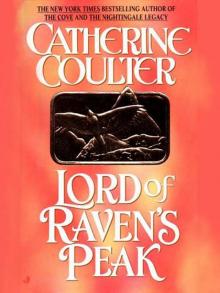 Lord of Raven's Peak
Lord of Raven's Peak The Wyndham Legacy
The Wyndham Legacy The Strange Visitation at Wolffe Hall
The Strange Visitation at Wolffe Hall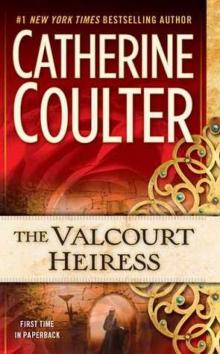 The Valcourt Heiress
The Valcourt Heiress Bombshell
Bombshell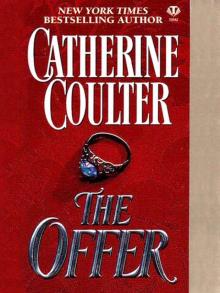 The Offer
The Offer The Edge
The Edge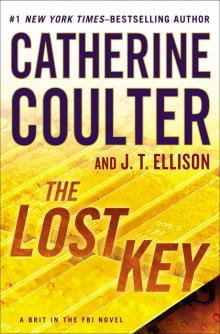 The Lost Key
The Lost Key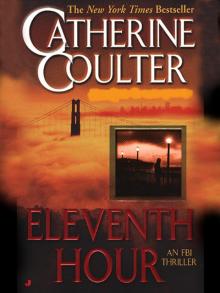 Eleventh Hour
Eleventh Hour Blindside
Blindside Devil's Daughter
Devil's Daughter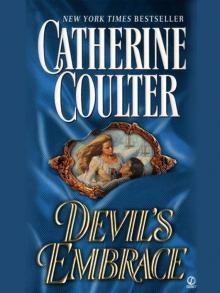 Devil's Embrace
Devil's Embrace Earth Song
Earth Song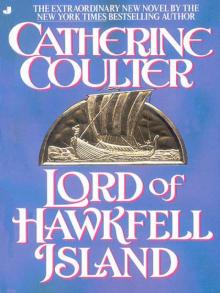 Lord of Hawkfell Island
Lord of Hawkfell Island Calypso Magic
Calypso Magic Lyon's Gate
Lyon's Gate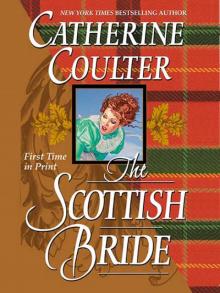 The Scottish Bride
The Scottish Bride Midsummer Magic
Midsummer Magic Split Second
Split Second Enigma
Enigma Blowout
Blowout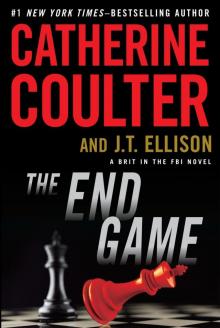 The End Game
The End Game Double Take
Double Take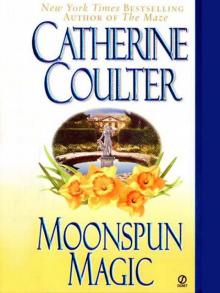 Moonspun Magic
Moonspun Magic The Courtship
The Courtship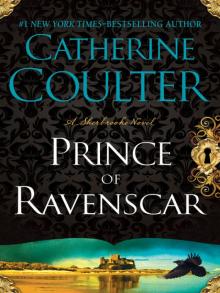 Prince of Ravenscar
Prince of Ravenscar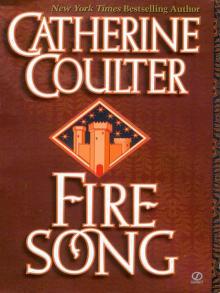 Fire Song
Fire Song Wizard's Daughter
Wizard's Daughter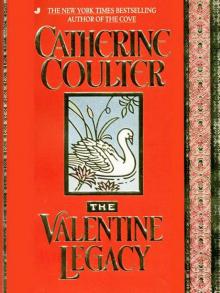 The Valentine Legacy
The Valentine Legacy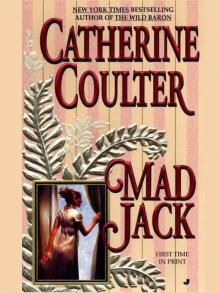 Mad Jack
Mad Jack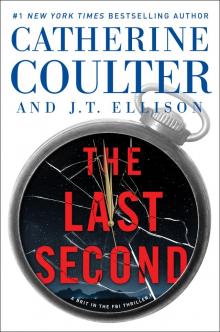 The Last Second
The Last Second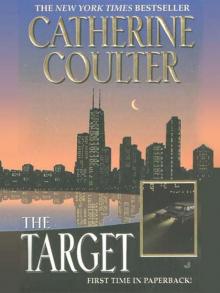 The Target
The Target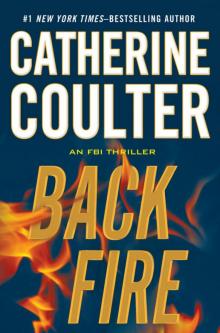 Backfire
Backfire Season of the Sun
Season of the Sun Hemlock Bay
Hemlock Bay Insidious
Insidious Riptide
Riptide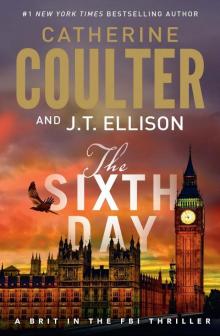 The Sixth Day
The Sixth Day Secret Song
Secret Song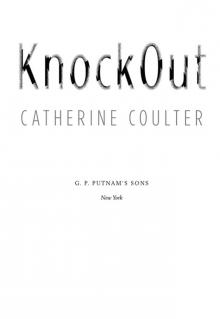 KnockOut
KnockOut Jade Star
Jade Star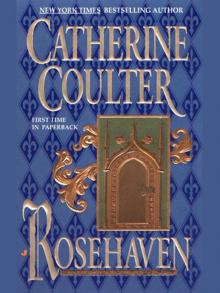 Rosehaven
Rosehaven The Hellion Bride
The Hellion Bride Pendragon
Pendragon Vortex
Vortex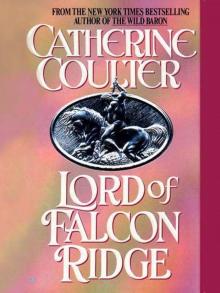 Lord of Falcon Ridge
Lord of Falcon Ridge The Nightingale Legacy
The Nightingale Legacy The Heiress Bride
The Heiress Bride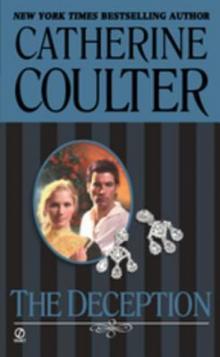 The Deception
The Deception The Maze
The Maze Evening Star
Evening Star Wild Star
Wild Star The Final Cut
The Final Cut Paradox
Paradox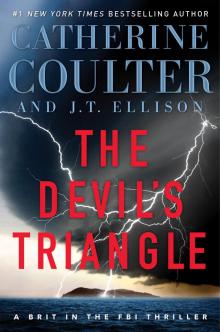 The Devil's Triangle
The Devil's Triangle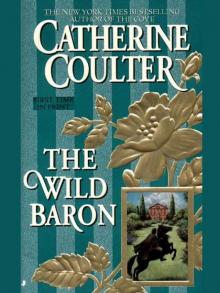 The Wild Baron
The Wild Baron Point Blank
Point Blank Labyrinth
Labyrinth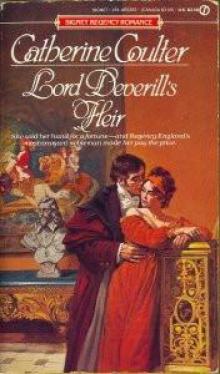 Lord Deverill's Heir
Lord Deverill's Heir The Sherbrooke Bride
The Sherbrooke Bride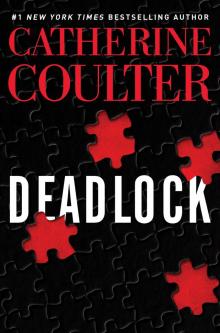 Deadlock
Deadlock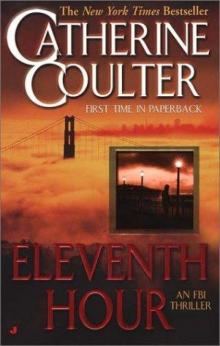 Eleventh Hour f-7
Eleventh Hour f-7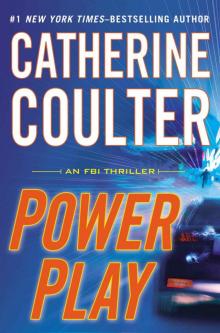 Power Play (An FBI Thriller)
Power Play (An FBI Thriller) Aftershocks
Aftershocks Sherbrooke Twins tb-8
Sherbrooke Twins tb-8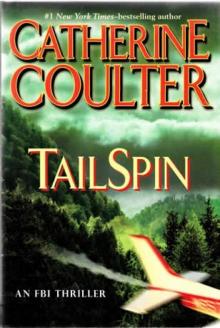 Tail Spin ft-12
Tail Spin ft-12 The FBI Thrillers Collection
The FBI Thrillers Collection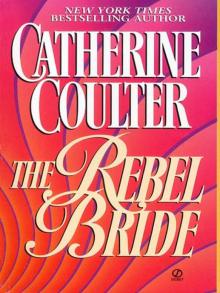 The Rebel Bride
The Rebel Bride Blindside f-8
Blindside f-8 Lyons Gate tb-9
Lyons Gate tb-9 Wyndham Legacy
Wyndham Legacy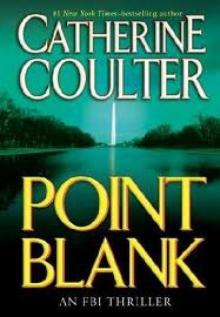 Point Blank f-10
Point Blank f-10 The Prince of Ravenscar
The Prince of Ravenscar Twice Dead
Twice Dead Night Shadow
Night Shadow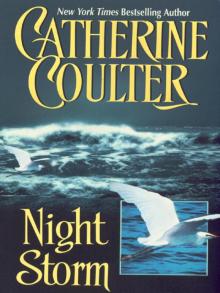 Night Storm
Night Storm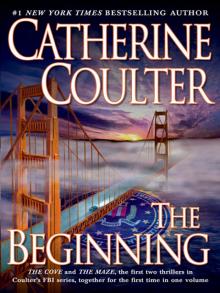 The Beginning
The Beginning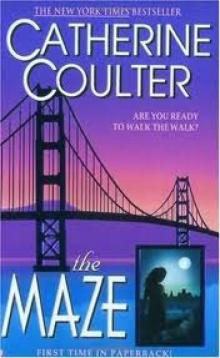 The Maze ft-2
The Maze ft-2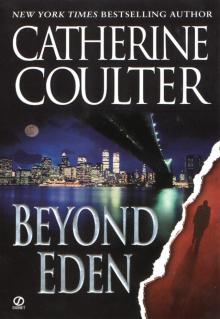 Beyond Eden
Beyond Eden The FBI Thrillers Collection: Vol 11-15
The FBI Thrillers Collection: Vol 11-15 FALSE PRETENSES
FALSE PRETENSES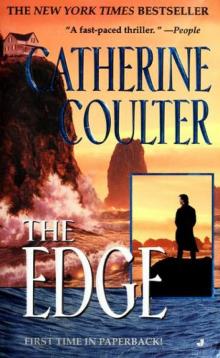 The Edge f-4
The Edge f-4 Bombshell (AN FBI THRILLER)
Bombshell (AN FBI THRILLER) The Ancient Spirits of Sedgwick House (Grayson Sherbrooke's Otherworldly Adventures Book 3)
The Ancient Spirits of Sedgwick House (Grayson Sherbrooke's Otherworldly Adventures Book 3)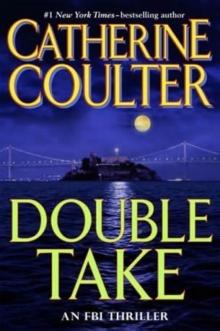 Double Take ft-11
Double Take ft-11 The Heir
The Heir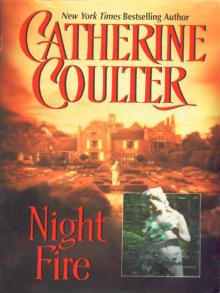 Night Fire
Night Fire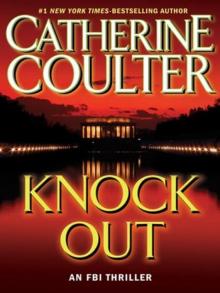 KnockOut ft-13
KnockOut ft-13 Hemlock Bay f-6
Hemlock Bay f-6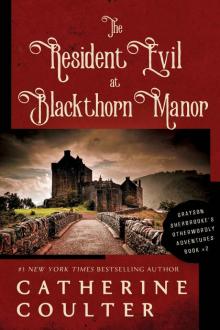 The Resident Evil at Blackthorn Manor (Kindle Single) (Grayson Sherbrooke's Otherworldly Adventures Book 2)
The Resident Evil at Blackthorn Manor (Kindle Single) (Grayson Sherbrooke's Otherworldly Adventures Book 2) Blowout ft-9
Blowout ft-9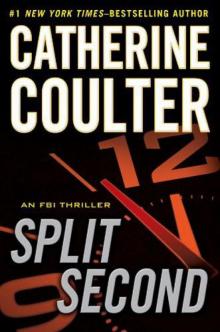 Split Second f-15
Split Second f-15 The Sherbrooke Series Novels 1-5
The Sherbrooke Series Novels 1-5 Impulse
Impulse Paradox (An FBI Thriller Book 22)
Paradox (An FBI Thriller Book 22)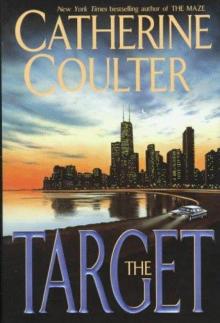 The Target f-3
The Target f-3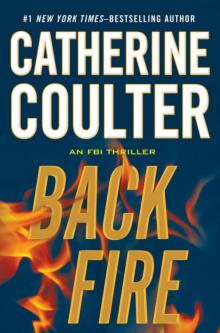 Backfire fst-16
Backfire fst-16 Born To Be Wild
Born To Be Wild Wizards Daughter tb-10
Wizards Daughter tb-10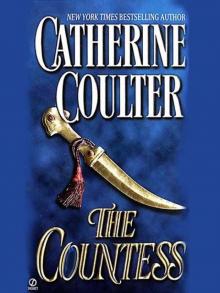 The Countess
The Countess